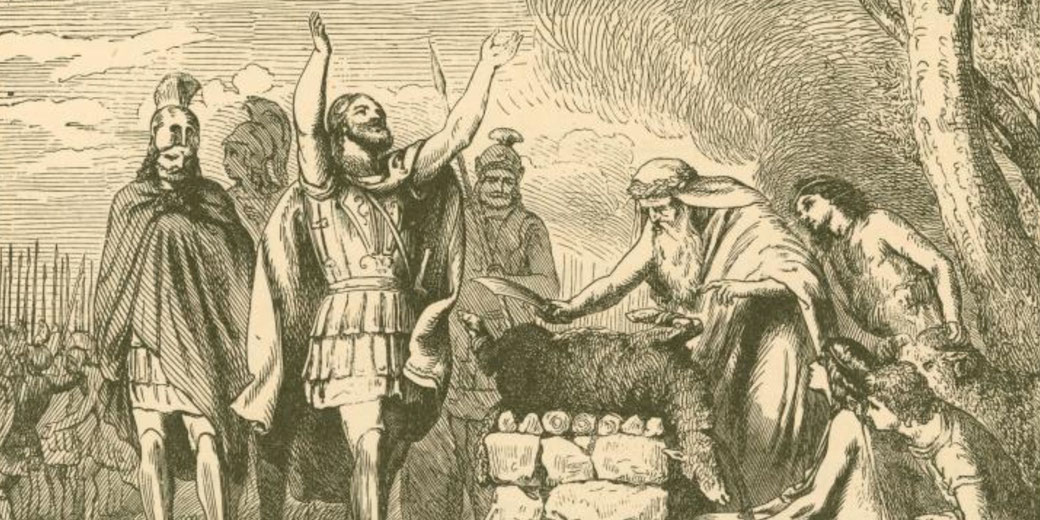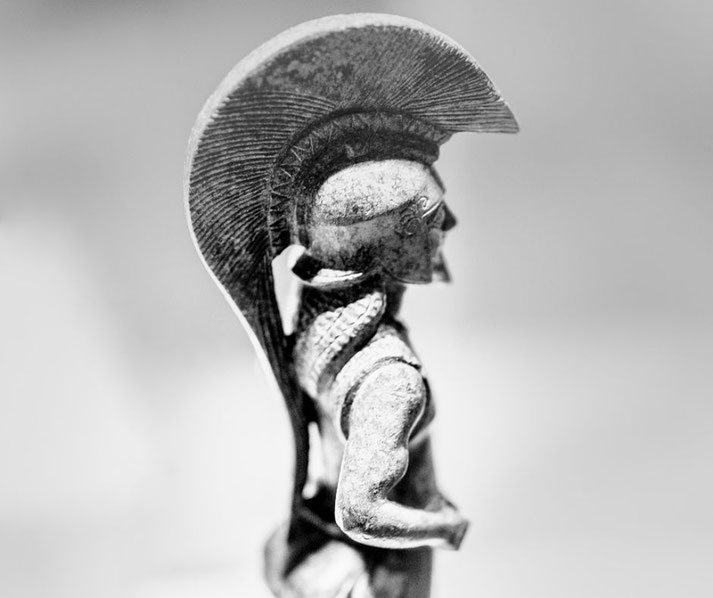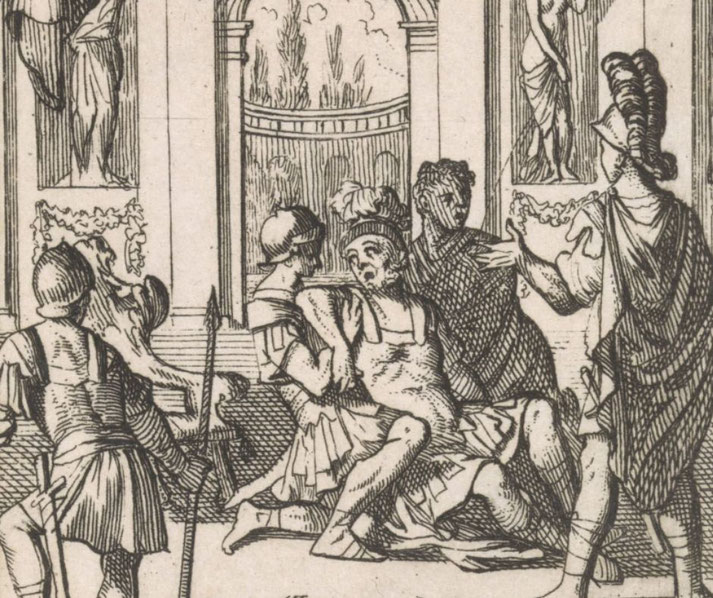Pausanias: The Spartan war hero who betrayed his homeland

One of the most respected and successful of all Spartan commanders quickly became one of the biggest threats to their survival.
Just years after defeating the unstoppable Persian army that was invading Greece, he choose to side with his former enemies and embrace a way of life that angered his fellow countrymen.
Why, when he was considered to be such a hero, did Pausanias commit the greatest act of treason?
And in what gruesome way did the Spartans choose to punish his betrayal?
Pausanias' royal bloodline
Pausanias was born into one Sparta’s two royal families as a member of the ancient Agiad dynasty.
He was the son of Cleombrotus and the nephew of King Leonidas I, the tragic hero of Thermopylae.
When Leonidas fell in battle against the Persians in 480 BCE, he left behind a young son, Pleistarchus, as the next in line to the throne.
As Pleistarchus was not yet of age, Pausanias, the cousin of the boy, was appointed regent and guardian, effectively leading the Spartan state in his stead.
Unfortunately, very little is recorded of Pausanias’s youth, but what we do know is that by the time of the Persian invasion of Greece, Pausanias was an experienced Spartan commander.
In 479 BCE, the Spartan ephors (otherwise known as 'magistrates') entrusted him with an army of 5,000 Spartans, who were each accompanied by several Helot attendants, to march north and confront the Persians.
Although Pleistarchus was the nominal king, Pausanias now held Sparta’s highest military command.

His role in the Persian Wars
By 479 BCE, the Greco-Persian Wars had reached a decisive phase. The Persian general Mardonius had used his large Persian army to reoccupy Athens and threatened to crush the Greek resistance.
Pausanias marched the Spartan-led allied army out of the Peloponnese and into central Greece.
Herodotus notes that the departure was kept so secret that envoys from other cities arrived in Sparta the next day scolding the Spartans for inaction, only to learn that Pausanias and his troops were already en route to face the Persians.
Pausanias’ sudden appearance forced Mardonius to withdraw from the ruins of Athens and fall back to Boeotia, near the town of Plataea.
There, on the plains north of Plataea, the Persian army made camp along the Asopus River, while Pausanias’s coalition of Spartans, Athenians, and other Greeks took up positions nearby.
According to Herodotus, Alexander of Macedon secretly rode into the Greek camp at night to warn the allies that Mardonius planned to attack at dawn.
Upon hearing this, Pausanias conferred with the Athenian general Aristides and proposed to exchanged positions so that the Athenians, who had experience fighting Persians at Marathon, would face the Persian infantry, while the Spartans would oppose the Greek allies on the Persian side, like the Thebans.
The Athenians agreed to this switch. When Mardonius reacted by maneuvering his Persians to face Pausanias’s Spartans once again, Pausanias coolly reversed the positions again.
His command at the Battle of Plataea (479 BCE)
The most famous moment of Pausanias' life occurred when the Battle of Plataea finally began in the summer of 479 BCE.
He commanded the largest Greek army yet assembled, with Spartans, Tegeans, Athenians, and dozens of other city-states. In the final deployment, Pausanias and the Spartan contingent held the right wing of the Greek line, opposite Mardonius and the elite Persian troops.
Just as the battle was about to begin, the Spartans took the typical ritual omens from animal sacrifices to ask for the gods' guidance.
However, they came back unfavorable for the Greeks. So, following religious custom, Pausanias held back the Spartan charge until the gods signalled approval, all while Persian archers rained arrows upon them.
Herodotus said that, “the Spartans ere hard pressed and their sacrifices of no avail, Pausanias lifted up his eyes to the temple of Hera at Plataea and called on the goddess, praying that they might not be disappointed of their hope.”
Immediately after this prayer, another sacrifice finally showed a good omen. At that moment, the allied Tegean troops dashed forward first, and Pausanias, seeing the favorable sign, gave the order for a full Spartan advance.
The Greek charge shattered the makeshift barricade of wicker shields that the Persians had set up.
Mardonius was easily visible on the battlefield thanks to his white horse and surrounded by his elite guard of a thousand Persians.
However, this made him an easy target and he was struck down and killed in the melee: reportedly by a Spartan warrior named Aeimnestus.
Almost immediately upon Mardonius’s death, Persian resistance crumbled. The Persians broke into flight under the onslaught of Spartan spears.
By day’s end, the victory was complete: the Persian camp was overrun and the vast invasion force routed.
Herodotus lauds this triumph, writing that “the most glorious of victories ever known to men was won by Pausanias, the son of Cleombrotus”.
The Greeks had both avenged the fallen Leonidas and also freed Greece from the immediate Persian threat.
In the aftermath of the battle, Pausanias presided over the distribution of the rich spoils of war taken from the Persian camp, including vast treasures and the luxurious tent of Mardonius himself.
There is a particularly famous anecdote that said that upon seeing the Persians’ ornate banquet spread, which included silver and gold tableware and extravagant foods, Pausanias ordered the Persian royal dinner to be served to him and his officers.
He then had a typical modest Spartan meal prepared alongside it. Struck by the stark difference, Pausanias laughed and exclaimed, “By Heaven, the Persian was a greedy fellow who, when he had all this, came after our barley-cake.”
This cutting remark, as recorded by Plutarch, showed Pausanias’ pride in Spartan simplicity in comparison to the Persians’ appetite for conquest despite their wealth.
Pausanias at this moment appeared every inch the noble Greek victor: pious, humble, and brave.
When things started to go wrong
In the wake of Plataea, Pausanias’s stature among the Greeks was unrivalled. He led the allied forces in ritual thanksgiving and dedicated a portion of the spoils to the gods.
In particular, he created a golden tripod from melting down captured Persian weapons, which was then offered to Apollo at Delphi.
Yet, Pausanias had an inscription engraved on this tripod that singled himself out for glory.
The verse praised “Pausanias, leader of the Greeks, who defeated the Medes”, crediting him alone for the victory.
Such self-aggrandizement was unheard of in usually modest Sparta and the Spartans back home were outraged when they learned of it.
They hastily removed Pausanias’s inscription and replaced it with the names of all the cities that had fought against Persia.
This incident was an early sign of Pausanias’s growing vanity.
Regardless, in 478 BCE, Pausanias was given command of the Greek coalition’s fleet and sailed to liberate remaining territories under Persian control.
According to Thucydides, Pausanias led a campaign to Cyprus, where he freed much of the island, and then seized the strategic city of Byzantium on the Bosporus.
During Byzantium’s capture, many high-ranking Persian prisoners, including relatives of King Xerxes, fell into Pausanias’s hands.
It was at the pinnacle of his authority that Pausanias reportedly began to display a streak of arrogance that alarmed his fellow Greeks.
The Spartan commander apparently began to adopt Persian dress and manners. Such behavior was deeply offensive to the Greek allies.
As a result, the Ionian Greeks and other recently liberated cities sent complaints back to Sparta that Pausanias was behaving like a tyrant.
The political consequences of Pausanias’s conduct were momentous. The non-Spartan Greek allies, especially the Ionians, appealed to Athens to take over leadership of the anti-Persian alliance.
They preferred Athenian command to further service under a man who, though a hero of Plataea, now seemed to regard himself above the laws and customs of Greece.
Seizing this opportunity, the Athenians, under Aristides and Cimon, accepted the leadership that Pausanias had forfeited.
The Spartans were normally jealous guardians of their leadership, but on this occasion, tacitly allowed Athens to assume control.
This was in part because Pausanias had become an embarrassment. Back in Sparta, rumors swirled about his conduct and the Spartan ephors recalled Pausanias to Sparta to answer these charges in around 477 BCE.

Pausanias' betrayal of Spartan ideals
Pausanias returned to Sparta to face an inquiry, but initially the evidence of wrongdoing was inconclusive.
He was too high-born and his services too recent for the Spartans to punish him severely without absolute proof.
As such, Sparta acquitted him of the most serious accusations at that time. However, he was not restored to another command.
Spartans were wary now and suspected that Pausanias might even aspire to set himself up as a tyrant in Sparta.
Pausanias defiantly left Sparta on his own and returned to the Aegean, and began operating without official sanction.
He stationed himself at Colonae in the Troad of Asia Minor, from where he allegedly began corresponding with the Persian king.
It was at this point that we are told that Pausanias’s intentions turned unmistakably treasonous.
Seeing an opportunity to gain even greater power. According to Thucydides, Pausanias entered into secret negotiations with King Xerxes (or possibly Xerxes’ successor) through the use of a Persian prisoner who was a close relative of Xerxes.
He sent him back to the King, as a gesture of goodwill, with a letter proposing an alliance.
In this letter, Pausanias wrote: “Pausanias, the general of the Spartans, wanting to do you a courtesy, sent back to you this mmn... And I have a purpose, if it is good to you, to take your daughter in marriage and to bring Sparta and the rest of Greece into subjection to you”.
Xerxes responded favorably to Pausanias’ proposal when he sent his letter in reply, and promised full support.
He urged Pausanias to spare no expense in carrying out their plan. Upon receiving Persian gold and further promises, Pausanias increasingly behaved as a Persian satrap rather than a Spartan citizen.
Apparently, he kept a bodyguard of Medes and Egyptians, and even at times insisted on the Persian protocol of prostration, or obeisance, before himself.
His charade of loyalty to Sparta was clearly slipping and his medism (collaboration with the Persians) was obvious evident to all.
When reports of Pausanias’ conduct reached Sparta, the ephors acted again. This time they sent a herald with the scytale (a Spartan message staff) commanding Pausanias to return to Sparta at once, under pain of being declared a public enemy.
Pausanias, perhaps overconfident in his clout or hoping to bribe his way out, did return to Sparta rather than face open war with his country.
On arrival, he was briefly imprisoned by the ephors to show that even royalty could be subject to under Sparta’s austere laws.
Though soon released, he remained under suspicion and surveillance.
For a time, Pausanias walked free in Sparta, unindicted, but closely watched. He was still a member of the royal family and regent to the underage king Pleistarchus, and had influential friends.
The ephors hesitated to prosecute a man of Pausanias’s stature without “unquestionable proof” of his treason.
That proof would soon emerge in dramatic fashion. Pausanias had been in communication with certain Helots who were Sparta’s subjugated serf class.
He is said to have promised them emancipation and citizenship if they would support an uprising in his favor.
This was effectively incitement to rebellion. Still, Spartan custom demanded irrefutable evidence.
Eventually, one of Pausanias’s own messengers provided it.
According to Thucydides, a man from Argilus (a city in Macedonia) who had been a trusted servant of Pausanias was given a letter to carry to Persia.
It was likely to have been to Pausanias’ contact, the satrap Artabazus. Growing suspicious because previous messengers on that route had mysteriously disappeared, this man opened the letter before delivering it.
To his horror, he found that Pausanias had included a directive for the Persians to kill the messenger after reading the letter, as a way of ensuring secrecy.
Betrayed by Pausanias, the messenger turned informant and delivered the letter to the Spartan ephors instead.
Now the evidence was literally in writing: proof that Pausanias was conspiring with the enemy.
Even with the letter in hand, the cautious ephors sought one last confirmation. They set a trap to catch Pausanias confessing with his own lips.
The informer from Argilus arranged to meet Pausanias at the temple of Poseidon at Taenarum, by the coast, under the pretense of fleeing Sparta.
Unbeknownst to Pausanias, the ephors concealed themselves nearby. When Pausanias arrived, the messenger confronted him about the order for his execution.
In the conversation that followed, Pausanias did not deny his intentions: he even apologized to the man and asked him to carry on with the plan.
He offered him rewards to do so, and thereby plainly implicated himself in treason.
The ephors listening in secret had heard all they needed. Pausanias had effectively condemned himself with his own tongue.
How Pausanias was killed
With Pausanias’s guilt now certain, the Spartan authorities moved to arrest him.
As the ephors approached to seize him in the public street, Pausanias caught sight of them and bolted from the gathering in a desperate bid for sanctuary.
Pausanias fled to the nearest holy ground, the Temple of Athena Chalcioikos (“Athena of the Bronze House”) on the Spartan acropolis.
He managed to get inside a small structure within the sacred precinct just ahead of his pursuers.
There, he hoped the sanctity of the goddess’s shrine would protect him from arrest or execution.
He knew that it was sacrilegious to kill a person on holy ground.
The Spartans, however, found a way to punish Pausanias without directly violating the temple.
They decided to entomb him alive. The ephors ordered that the doors of the building be barred, then, brick by brick, built a wall around the perimeter of the temple-house.
Pausanias was trapped inside and could only wait as the light was shut out and his countrymen stood guard outside.
They intended to leave him there until starvation and dehydration did what Spartan law could not directly do on sacred soil.
For days, Pausanias languished in the makeshift cell, suffering the slow agony of hunger and thirst.
Only when he was on the verge of death did the Spartans drag him out, unwilling to have the actual moment of death occur within Athena’s sanctuary, which would ‘pollute’ the shrine.
As soon as Pausanias was brought out into the open air, he breathed his last – dying just outside the temple that had briefly been his refuge.
It was an ignominious end for the once-mighty victor of Plataea. The year was around 471–470 BCE, although some sources place his death in 469 or 467 BCE, and Pausanias was likely in his mid-forties.
Immediately after his death, Sparta made a point of burying his body nearby, outside the temple, rather than casting it into the Caeadas, which was the chasm for traitors’ corpses.
Still, the manner of Pausanias’s death was considered a religious affront. The Oracle of Delphi reportedly rebuked the Spartans for killing so close to holy ground, and it demanded they propitiate Athena for the desecration.
To atone, the Spartans dedicated two bronze statues to Athena Chalcioikos, symbolically offering “two bodies for the one” as the oracle prescribed.
Some ancient historians record dark legends around Pausanias’s end. One later account claims that Pausanias’s own mother, named Theano, participated in her son’s punishment.
As the story goes, when the decision was made to seal Pausanias in the temple, Theano brought the first brick and placed it in the doorway, where she declared that she would rather see her son dead than unfaithful to Sparta.
What do you need help with?
Download ready-to-use digital learning resources
Copyright © History Skills 2014-2025.
Contact via email
With the exception of links to external sites, some historical sources and extracts from specific publications, all content on this website is copyrighted by History Skills. This content may not be copied, republished or redistributed without written permission from the website creator. Please use the Contact page to obtain relevant permission.





